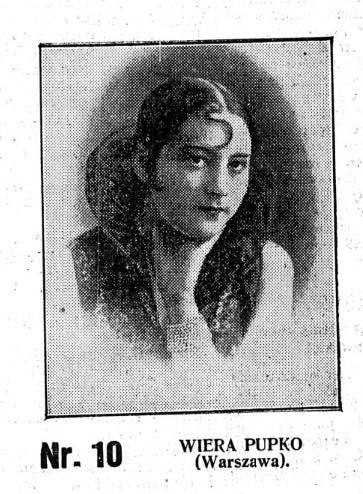
Wiera Pupko, a photo from the beauty pageant competition in “Nasz Przegląd” (Our Review), 1929.

“Miss Wiera Pupko (No. 10) asks us to note that, for reasons beyond her control, she is forced to withdraw from the competition.”
Wiera, affectionately called “Wieruszka” by her relatives, was born in 1907 in Lida as the daughter of Isaac Pupko and Maria (née Trakiner). Shortly after her birth, the family moved to Vilnius, and after World War I, they relocated to Warsaw. According to the recollections of her cousin, Irene Newhouse Pupko, Wiera’s parents sent her to Belgium to study vocational counseling. They, on the other hand, became trapped in Warsaw, from where, in August 1941, Wiera received the last postcard written by her father.
From left to right: Wiera Pupko with an unknown person,
Maria Pupko, née Trakiner, Wiera’s mother,
Isaac Pupko, Wiera’s father,
photos from the family collection of Irene Newhouse, née Pupko.

The last card Wiera received from her father from the Warsaw Ghetto, from the family collection of Irene Newhouse, née Pupko.
When deportations of Jews from Belgium began, Wiera managed to escape to Cuba, where she worked as a diamond cutter.
But how is that possible? To Cuba? During the war and without specialized education? It turns out that during the war, Cuba admitted 6,000 Jewish diamond cutters and their relatives fleeing from Belgium, and Wiera was among them.

Passenger list from Havana to Miami, Wiera Pupko is the last one on the list.

On May 3, 1948, Wiera arrived in the United States, where she married Emil Turnheim and started a new life. According to Irene’s memories, Wiera was interested in the lives of her relatives but was reluctant to delve into her own past. To any inquiries about her pre-war life, she would reply, “It should be enough that I say so.” When Irene started taking notes, Wiera fell silent and waited for her to put down the pen. In the end, Irene and her mother found a way to persuade her by bribing her with her favorite cornbread muffins.
Wiera Turnheim Pupko passed away in New York in 1989.
Sources:
Impressum:
Design: lukaszhajduk.com
Code: tomhajduk.com
Photo: @kasia_kaleta
Polityka prywatności
Regulamin sklepu
All rights reserved ® Marta Maćkowiak 2025